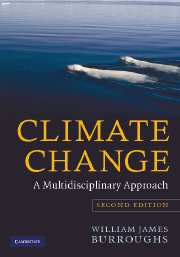Book contents
- Frontmatter
- Contents
- Preface to the second edition
- 1 Introduction
- 2 Radiation and the Earth's energy balance
- 3 The elements of the climate
- 4 The measurement of climate change
- 5 Statistics, significance and cycles
- 6 The natural causes of climate change
- 7 Human activities
- 8 Evidence of climate change
- 9 Consequences of climate change
- 10 Modelling the climate
- 11 Predicting climate change
- Glossary
- Bibliography
- Index
11 - Predicting climate change
Published online by Cambridge University Press: 05 June 2012
- Frontmatter
- Contents
- Preface to the second edition
- 1 Introduction
- 2 Radiation and the Earth's energy balance
- 3 The elements of the climate
- 4 The measurement of climate change
- 5 Statistics, significance and cycles
- 6 The natural causes of climate change
- 7 Human activities
- 8 Evidence of climate change
- 9 Consequences of climate change
- 10 Modelling the climate
- 11 Predicting climate change
- Glossary
- Bibliography
- Index
Summary
Some people ask, “What if the sky were to fall?”
Terence (Publius Terentius Afer), c190–150 bcThe obvious starting point in this chapter is to consider what we mean by predictability. A helpful approach is to say that it is the extent to which it is possible to predict the climate with a theoretically complete knowledge of the physical laws governing it. Using this definition of predictability, it follows from the discussion of computer models of the climate in Chapter 10 that predicting how the climate may change over the next century or so faces four basic challenges. The first is model error and how much we can improve the mathematical representation of the workings of the climate. The second is the closely related question of reducing the initial-condition error to ensure that the model starts with as accurate a representation of the state of the climate system as possible. The third is how do we measure the results of our studies. Finally, there is the issue of the potential for generalising the concepts and results of the model in framing policy.
The final concept of the generalisation of the results of modelling studies leads us into the economic and social consequences of any future climate change. Here the prediction is even more difficult. Because economic models lack the well-defined physical laws that underpin climate models the uncertainties are much greater. In particular, these uncertainties hinge on public behaviour in the light of any emerging evidence of climate change.
- Type
- Chapter
- Information
- Climate ChangeA Multidisciplinary Approach, pp. 321 - 344Publisher: Cambridge University PressPrint publication year: 2007



